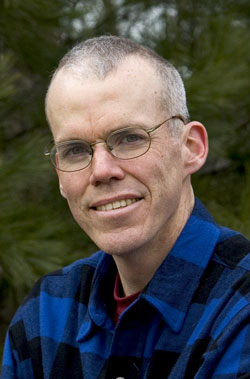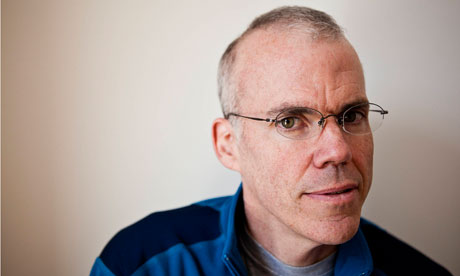Bill McKibben
William Ernest "Bill" McKibben ( born December 8, 1960 in Palo Alto, California) is an American environmental activist and author.
Life
He wrote many books on the topics of global warming and alternative energy. Furthermore, he is committed to a localization of the economy. In the summer of 2006, he led the largest demonstration in American history against global warming. In 2009, he led the activities of the organization 350.org, which took place with 5,200 simultaneous demonstrations in 181 countries, in order to draw attention to the problem of global warming.
The magazine " Foreign Policy " leads him in the list of 100 most important global thinkers, and MSN ranks him one of the most influential people of 2009. Currently he lives with his wife Sue Halpern, and their daughter Sophie ( * 1993) in Vermont.
Publications
McKibben published posts, among other things in the magazines The New York Times, The Atlantic Monthly, Harper's, Orion magazine, Mother Jones, The New York Review of Books, The Middlebury Campus, Granta, The National Geographic, Rolling Stone, and Outside.
- His first book, The End of Nature, was published in 1989 by Random House. It is considered one of the first books that has a broad mass brought closer to the global warming issue. The book has been translated into over 20 languages. In the United States now several editions, including a 2006 revised version were laid.
- His second book, The Age of Missing Information, was published in 1992. It's about an experiment in which McKibben for a day every TV show of the 100 cable channels recorded, as was sent. He then spent over a year with the sighting of over 2400 hours of video recordings and compared it to spend one day in the mountains near his home. This book is often used in the classroom and reissued in 2006.
More books were Hope, Human and Wild, about Curitiba (Brazil) and Kerala (India) in which he reports on cities, where people live with less ecological " footprint". The Comforting Whirlwind: God, Job, and the Scale of Creation, which is about the Book of Job and the environment; Maybe One, about the population of mankind; Long Distance: A Year of Living strenuously, more than a year training to elite level and Enough, about the existential threats in his view of genetic engineering and nanotechnology. Wandering Home, is a long hiking trip from his current residence in Vermont to the Adirondacks. The book, Deep Economy: the Wealth of Communities and the Durable Future, published in March 2007, was a national bestseller. It addresses the adverse from the point of view of the author aspects of growth- based economic model and calls for a transition to an increasingly localized economy from the autumn of 2007 he published with other members of the " Step it up teams " Fight Global Warming Now, a handbook for activists plan local activities. In 2008, The Bill McKibben Reader appeared: Pieces from to Active Life, a collection of essays that describe his work. "American Earth" was released in 2008, a collection of American Environmental Scientific publications since Thoreau edited which McKibben.
Awards
- Lyndhurst Fellowship
- 1993: Guggenheim Fellowship
- 2000: Lannan Literary Award for Nonfiction
- 2013: Thomas Merton Award
- Honorary title: Sterling College ( Sterling, Vermont)
- Green Mountain College
- Unity College ( Maine)
- State University of New York
- Colgate University
- Lebanon Valley College
Campaigns
- Step It Up 2007 is a US-wide grassroots campaign (organized from the bottom up ), which was founded by McKibben and a campaign to ensure that the U.S. Congress against the ongoing global warming is active. In late summer 2006, he led, together with others, a 5-day march through Vermont to his demand to do something about global warming, to give emphasis. Newspapers reported this action as one of the largest demonstrations against climate change. In January 2007, he founded " Step It Up 2007," with the aid of rallies in hundreds of American cities and villages were organized on 14 April 2007 to demand a 80 % reduction in CO2 emissions by 2050. The campaign won broad support from environmental and student groups and religious bodies very quickly. In August 2007 McKibben " Step It Up 2 " announced, which took place on 3 November 2007. In addition to the 80 % reduction target by 2050 a 10 % reduction in emissions was required in three years ( "Hit the Ground Running" ), a moratorium on new coal-fired power plants and a Green Jobs Corps equips the private and commercial buildings, so that the set objectives can be achieved.
- The same core team called in March 2008 from the 350.org campaign. The aim of the organization is its name is derived from the required maximum CO2 concentration in the atmosphere of 350 ppm, the initiation of a global movement. This number goes back to the climatologist James E. Hansen, which ranks an atmospheric CO2 concentration of about 350 ppm ( parts per million) as unsafe, if the goal of humanity is to preserve the earth as it during the history of human development mostly looked. Abstract In his publication he put forward the assertion: "If humanity wishes to preserve a planet similar to did on Which civilization developed and to Which life on Earth is angepasst, paleoclimate evidence and ongoing climate change suggest did CO2 will need to be Reduced from its current 385 ppm to at most 350 ppm, but likely less than that. " 350.org operates offices in North America, Europe, Asia, Africa and South America. The aim was to manifest itself in advance of the UN Climate Change Conference in Copenhagen in 2009, the number 350 as the target. On October 24, 2009 350.org coordinated more than 5,200 demonstrations in 181 countries. Under the creative use of advanced Internet applications, both the organization of the day was conducted and documented its success. This was one of the strongest examples of the use of social networks. In addition, 350.org supported the 10:10 campaign, which wanted to achieve a reduction in CO2 emissions by 10 % by the year 2010.
Bibliography
- The End of Nature ( 1990) ISBN 0-385-41604-0
- The Age of Missing Information ( 1992) ISBN 0-394-58933-5,
- Hope, Human and Wild: True Stories of Living Lightly on the Earth (1995 ) ISBN 0-316-56064-2
- Maybe One: A Personal and Environmental Argument for Single Child Families (1998) ISBN 0-684-85281-0
- Hundred Dollar Holiday ( 1998) ISBN 0-684-85595- X
- Long Distance: Testing the Limits of Body and Spirit in a Year of Living strenuously (2001) ISBN 0-452-28270-5
- Enough: Staying Human in at Engineered Age (2003) ISBN 0-8050-7096-6
- Wandering Home (2005) ISBN 0-609-61073-2
- The Comforting Whirlwind: God, Job, and the Scale of Creation ( 2005) ISBN 1-56101-234-3
- Deep Economy: The Wealth of Communities and the Durable Future ( 2007) ISBN 0-8050-7626-3 Reviewed in Tim Flannery, " We're Living on Corn! " The New York Review of Books 54/11 (28 June 2007 ): 26-28
Article
- Time for Some Angry Work 06-24-2010 Sojourners
- Why Not Frack? ( March, Apri, & May 2012) The New York Review of Books
- Http://www.nybooks.com/articles/archives/2011/may/12/eco-elephant/ (2011)
- Http://www.nybooks.com/articles/archives/2007/mar/15/warning-on-warming/ (2007)

-HighRes.jpg)






-lowres.jpg)

